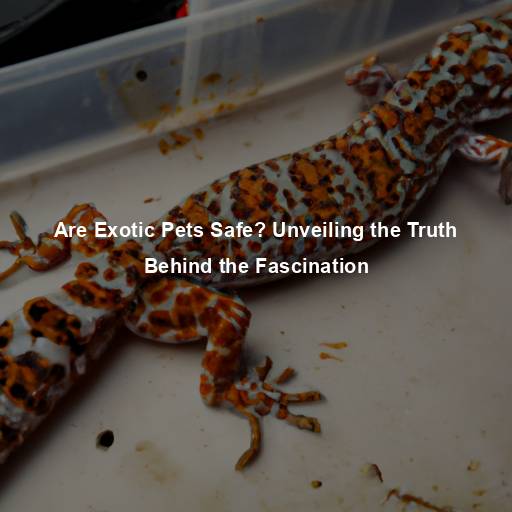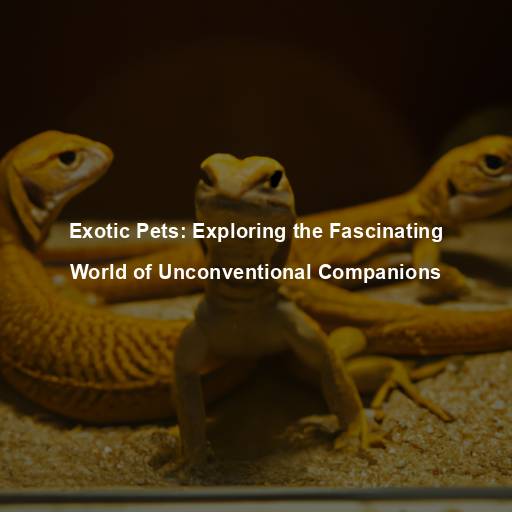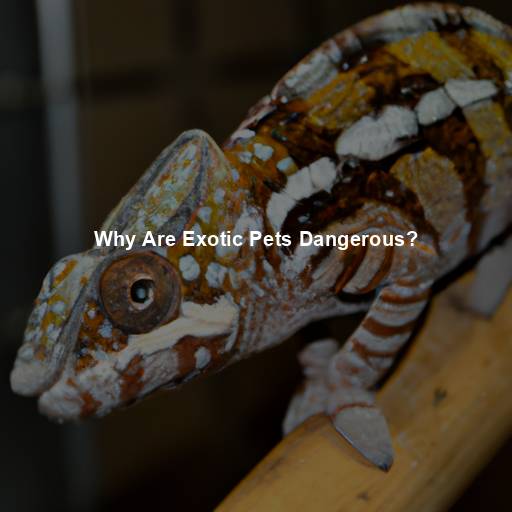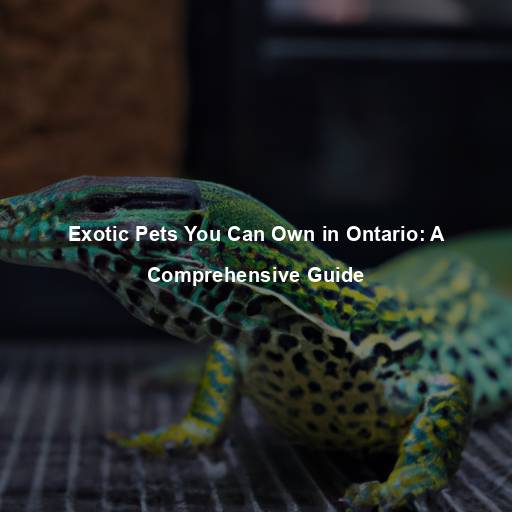Are Exotic Pets Safe? Unveiling the Truth Behind the Fascination
Last Updated on July 19, 2023 by Evan
Contents
- 1 Exploring the Complex World of Exotic Pet Ownership
- 1.1 The Fascination with Exotic Pets
- 1.2 Understanding the Risks
- 1.3 The Responsibilities of Exotic Pet Ownership
- 1.4 Responsible Alternatives to Exotic Pets
- 1.5 Navigating the Moral Landscape
- 1.6 Animal Welfare and Captivity
- 1.7 Conservation and Illegal Trade
- 1.8 Disruption of Ecosystems
- 1.9 Cultural and Historical Context
- 2 The Legal Landscape of Exotic Pet Ownership
- 3 The Education and Awareness Imperative
- 4 FAQs: Is Exotic Pets Safe?
- 4.1 Q: What are exotic pets?
- 4.2 Q: Are exotic pets safe to keep?
- 4.3 Q: What are the potential risks of owning exotic pets?
- 4.4 Q: Do exotic pets pose any harm to their owners?
- 4.5 Q: Are exotic pets legal to own?
- 4.6 Q: Can exotic pets be harmful to the environment?
- 4.7 Q: Should I get an exotic pet?
- 4.8 Q: What should I consider before getting an exotic pet?
- 4.9 Q: Can exotic pets be a suitable choice for children?
- 4.10 Q: Where can I find more information about specific exotic pets?
Exploring the Complex World of Exotic Pet Ownership
The world of pet ownership is as diverse as the animals themselves, with those seeking unconventional companionship looking towards the allure of exotic pets. From faraway lands, these captivating creatures bring a unique and perplexing appeal to those willing to venture outside the realm of traditional furry friends. However, this path is not without its challenges, as the question of safety arises. In this thought-provoking piece, we will explore the complex world of exotic pet ownership, shedding light on the risks, responsibilities, and ethical considerations that accompany such a choice.
The Fascination with Exotic Pets
Throughout history, humans have been fascinated by the enchanting world of exotic pets. The mystique of owning a captivating creature from far-flung lands, adorned with vibrant hues and displaying bewitching behaviors, is simply irresistible. Whether it be the majestic magnificence of a Bengal tiger or the irresistible allure of a sugar glider, these extraordinary creatures possess an alluring charisma that sets them apart from the conventional domestic pets we are accustomed to. Nevertheless, it is of utmost importance to acknowledge that amidst this beguiling appeal lies inherent risks and daunting challenges that must not be overlooked, for they can result in profound consequences.
Understanding the Risks
Owning an exotic pet comes with a unique set of risks that differ significantly from those associated with traditional pets. These risks encompass not only the safety of the owner but also the well-being of the animal and the potential impact on the environment. Let us delve into some of the key risks associated with owning an exotic pet:
Health and Safety Concerns
Exotic animals may carry zoonotic diseases, which can be transmitted to humans. These diseases, such as salmonellosis or monkeypox, can pose a significant threat to the health and well-being of both the owner and the general population. Additionally, exotic pets may exhibit aggressive behavior, which can lead to injuries and harm to humans or other animals.
Habitat and Environmental Considerations
Keeping exotic pets can be quite a perplexing endeavor, as it demands meticulous attention to their unique needs. These captivating creatures thrive under specific environmental circumstances, which often include precise temperatures, humidity levels, and specialized diets. However, ensuring these conditions can be a burst of challenges, leading to potential stress or malnourishment for these fascinating beings. Additionally, there is a pressing concern about the consequences of their potential escape or release into the wild, as certain exotic species may pose a significant threat to the delicate balance of local ecosystems, causing irreversible damage to the native flora and fauna.
Legal and Ethical Concerns
The possession of exotic pets is subject to varying legal restrictions and regulations, depending on the country, state, or municipality. These regulations aim to protect both the animals and the public from potential harm. Ethical concerns also come into play when considering the moral implications of capturing and confining animals that are meant to roam freely in their natural habitats.
The Responsibilities of Exotic Pet Ownership
Owning an exotic pet is not a decision that should be taken lightly. It requires a high level of commitment, responsibility, and specialized knowledge to ensure the well-being and safety of both the animal and the owner. Let’s explore some of the key responsibilities that arise when considering exotic pet ownership:
Extensive Research and Education
Before acquiring an exotic pet, it is crucial to thoroughly research the species of interest. Understanding their specific needs, behaviors, and potential health risks is essential for providing appropriate care and ensuring a safe environment. Seeking guidance from experts and reputable sources is vital in acquiring the necessary knowledge to meet the unique requirements of the chosen exotic pet.
Adequate Housing and Enrichment
Creating an optimal environment for exotic animals is no easy feat. These unique creatures demand housing that emulates their native habitats, necessitating careful attention to details such as space, temperature, and humidity. In neglecting these critical factors, we risk subjecting these majestic beings to stress, behavioral challenges, and even endangering their overall health.
Veterinary Care and Nutrition
When it comes to keeping exotic pets, being on top of their health is an absolute must. Regular visits to experienced veterinarians who specialize in exotic animal medicine are crucial in ensuring the wellbeing of these unique creatures. These experts are equipped to offer advice on everything from nutrition and vaccinations to disease prevention, all geared towards keeping your unusual pet happy and healthy. Don’t even think about taking on the ownership of an exotic pet without making sure you have access to proper veterinary care.
Commitment to Long-Term Care
In a world where pets come in all shapes and sizes, it’s the exotic ones that catch our attention, with their captivating allure and enigmatic charm. But before diving into the world of unconventional companions, it’s crucial to acknowledge the perplexing truth: these extraordinary creatures have a knack for defying the bounds of time. Unlike their more conventional counterparts, exotic pets have a way of outlasting expectations, beckoning potential owners to embark on a journey of uncertainty, both exciting and challenging. Beyond the thrill and allure lies a commitment that can leave anyone scrambling to gather the necessary resources—financial, temporal, and emotional—to ensure a lifetime of well-being for these enigmatic creatures.
Responsible Alternatives to Exotic Pets
When it comes to the irresistible appeal of owning exotic pets, we mustn’t lose sight of the utmost importance of considering responsible alternatives that prioritize the well-being of animals and contribute to conservation endeavors. Instead of succumbing to the allure of exotic creatures, let us explore and embrace responsible alternatives that nurture animal welfare and support the preservation of our natural world. By doing so, we can strike a harmonious balance between our desires and the vital need to protect and care for the diverse and precious species that share our planet.
Supporting Conservation Initiatives
Rather than owning an exotic pet, individuals can support conservation organizations and initiatives dedicated to protecting endangered species and preserving their natural habitats. By contributing to these efforts, individuals can make a positive impact on wildlife conservation globally.
Exploring Domesticated Pets
Traditional domesticated pets, such as cats, dogs, and small mammals like guinea pigs or rabbits, offer companionship and love without the unique challenges and risks associated with exotic pets. Adopting a rescue animal or supporting local animal shelters can provide a loving home to animals in need.
Visiting Accredited Zoos and Sanctuaries
Embarking on a captivating journey through the realm of enchanting creatures, seekers of exotic wonders can now unlock a realm of ethical discovery and enlightenment. Let accredited zoos and sanctuaries become your gateway to a realm where the welfare of extraordinary beings reigns supreme, unveiling a sanctuary where education and conservation thrive harmoniously. Within these hallowed grounds, curious minds can indulge in the privilege of observing and immersing themselves in the lives of majestic species, all in a meticulously curated and conscientious setting.
Embarking on the fascinating journey into the realm of exotic pet ownership allows us to unlock a world filled with awe-inspiring creatures. However, this captivating allure comes with a whirlwind of perplexing ethical considerations that warrant our undivided attention. As we navigate through this intricate landscape, it becomes increasingly imperative to delve deep into the moral implications that lie beneath the surface, contemplating the profound consequences for animal welfare, conservation initiatives, and the delicate balance of our environment. Eagerly embracing the complexities that surround this practice will unlock invaluable insights, prompting us to weigh the benefits against the burdens and ultimately make conscientious choices that shape a harmonious coexistence with our remarkable companions.
Animal Welfare and Captivity
When it comes to keeping exotic animals as pets, there’s a curious twist that has us all pondering their happiness and general state of being. You see, these unique creatures have been molded by Mother Nature herself to flourish in wide open spaces, displaying all sorts of intricate behaviors and social interactions. But alas, being coerced into captivity can put a damper on their innate instincts, resulting in a mixture of physical and psychological perplexities. The million-dollar question, my dear readers, remains whether the companionship we gain from these extraordinary pets truly outweighs the consequences of stripping them away from their cherished natural habitats.
Conservation and Illegal Trade
The demand for exotic pets has led to rampant illegal wildlife trafficking, which poses a severe threat to endangered species and their habitats. The capture and trade of these animals often involve cruel methods, causing immense suffering and endangering the survival of already vulnerable populations. By refusing to participate in the exotic pet trade, individuals can contribute to conservation efforts and help protect these species in their natural habitats.
Disruption of Ecosystems
With the arrival of unfamiliar species in unfamiliar territories, a Pandora’s box of complications opens up for the delicate balance of local ecosystems. Once unleashed, exotic pets have the potential to overpower indigenous species in the unending scramble for resources, leading to a chaotic disruption of the natural order. The dire consequences may reach as far as the darkest corner of extinction, silently erasing the existence of native plant and animal life. All this serves as a resounding reminder that we must assume the weight of responsibility and carefully ponder the consequences of our actions upon the very environment we inhabit.
Cultural and Historical Context
The allure of owning unusual pets often stems from rich cultural customs and historical backdrops, causing a perplexing mix of fascination. Nevertheless, it becomes increasingly necessary to examine these longstanding beliefs with a fresh, modern viewpoint. With our growing knowledge of animal welfare, conservation, and ethical considerations, it becomes imperative to reevaluate the suitability of keeping exotic pets and adjust our attitudes to align with the changing times.
The Legal Landscape of Exotic Pet Ownership
Owning an exotic pet comes with unique risks and challenges, including health and safety concerns, habitat and environmental considerations, legal and ethical concerns, and the need for extensive research, education, housing, veterinary care, and long-term commitment. Responsible alternatives to exotic pets include supporting conservation initiatives, exploring domesticated pets, and visiting accredited zoos and sanctuaries. The legal landscape of exotic pet ownership is complex and varies across regions and countries, so it is crucial to understand and comply with local laws and regulations. Education and awareness are essential in promoting responsible decision-making, and collaboration with experts can provide valuable guidance and resources. The media should accurately depict the complexities and risks of owning exotic pets and emphasize animal welfare, conservation, and ethical considerations.
The legality of owning exotic pets varies greatly across different regions and countries. It is crucial for potential owners to familiarize themselves with the local laws and regulations to ensure compliance and avoid potential legal consequences. Let’s explore some key aspects of the legal landscape surrounding exotic pet ownership:
National and International Laws
In an increasingly interconnected world, the issue of exotic pet ownership has sparked a web of laws and regulations. These intricate measures seek to balance the well-being of animals, the safety of humans, and the preservation of biodiversity. Before embarking on the journey of acquiring an exotic pet, it is imperative to dive into the labyrinthine depths of research and comprehend the unique regulations that delineate one’s country or region. The treasure trove of knowledge gained will safeguard against the illicit machinations of wildlife trafficking and foster a sense of responsibility towards conservation efforts.
CITES and Protected Species
The Convention on International Trade in Endangered Species of Wild Fauna and Flora (CITES) is an international agreement aimed at protecting endangered species through the regulation of their trade. CITES lists species into three appendices, with Appendix I providing the highest level of protection. It is crucial to be aware of the CITES status of any desired exotic pet, as owning protected species may be illegal or require special permits.
Local Municipal Laws
In addition to national regulations, local municipalities may have their own laws and ordinances regarding exotic pet ownership. These laws can vary widely, ranging from outright bans on certain species to strict permit requirements. It is essential to consult local authorities or legal experts to ensure compliance with these regulations.
Consequences of Illegal Ownership
When it comes to having an exotic pet, there’s a whole legal maze to navigate through. Ignorance of the laws can lead to a pet owner facing some hefty consequences, such as fines, losing their precious animal companion, or even landing themselves in a sticky criminal situation. It’s absolutely crucial to wrap our heads around the legal framework in order to avoid unintentional slip-ups that could not only harm the animal, but also the would-be owner. So, let’s get familiar with the do’s and don’ts of exotic pet ownership, shall we?
The Education and Awareness Imperative
Promoting Responsible Decision-Making
In our intertwined relationship with exotic pets, there lies a labyrinth of intricacies that demand our attention. We must embrace the path of knowledge and consciousness, for it is within those realms that the keys to responsible ownership and ethical considerations reside. Let us delve deeper into the realm of understanding, empowering ourselves to safeguard not only the welfare of these creatures but also the fragile balance of our natural realm.
Public Education and Outreach
Government agencies, conservation organizations, and animal welfare groups play a crucial role in promoting public education and outreach initiatives. These efforts focus on raising awareness about the potential harms associated with owning exotic pets, the importance of conservation, and responsible alternatives.
Responsible Pet Ownership Programs
Promoting responsible pet ownership extends beyond traditional domesticated animals. Including information about the risks and responsibilities of owning exotic pets in existing pet ownership programs can help potential owners make informed decisions and understand the specific needs and challenges associated with exotic species.
Collaboration with Experts
In the vibrant realm of exotic pet ownership, forging partnerships with distinguished authorities in the field holds boundless promise. By joining forces with revered veterinarians well-versed in the intricacies of these extraordinary creatures, alongside astute ethologists and far-sighted conservation biologists, one can access a treasure trove of wisdom. Informed by their deep-seated expertise, these esteemed professionals can lend invaluable support to educational endeavors, furnish invaluable resources for prospective owners, and play a pivotal role in shaping the policies and regulations that govern this captivating realm. Harnessing this collective brilliance, the world of exotic pets stands poised for transformation and evolution like never before.
Ethical Considerations in Media
The media has a significant influence on public perception and attitudes towards exotic pets. Responsible journalism should strive to accurately portray the complexities and risks involved in exotic pet ownership, highlighting the importance of animal welfare, conservation, and ethical considerations.
FAQs: Is Exotic Pets Safe?
Q: What are exotic pets?
A: Exotic pets refer to non-traditional or non-domesticated animals kept as pets, such as reptiles, birds, small mammals, or even certain types of insects. These animals are usually not found commonly as household pets and require special care and handling.
Q: Are exotic pets safe to keep?
When it comes to the safety of having exotic pets, there’s a whirlwind of considerations to navigate. Each creature boasts its own enigmatic complexity, making it impossible to generalize. For seasoned owners who possess the know-how and commitment to cater to these extraordinary beings’ idiosyncratic demands, some exotic pets may prove harmonious companions. Alas, others may boldly present obstacles, concealing unforeseen perils behind their captivating façades. To embark upon this exotic adventure, one must embark upon an intricate tapestry of research, fully comprehending the nuances of their chosen companion’s needs, behaviors, and medical prerequisites.
Q: What are the potential risks of owning exotic pets?
A: Owning exotic pets can present several risks. These animals may carry diseases that can transmit to humans, especially if proper hygiene and sanitation measures are not followed. Additionally, some exotic pets might have unpredictable temperaments or specific environmental needs that are difficult to meet in a home setting. Furthermore, their specialized diet and housing requirements can be costly and time-consuming to maintain.
Q: Do exotic pets pose any harm to their owners?
Exotic pets, fascinating and enchanting as they may be, possess an inherent enigma that demands cautious consideration. Their inscrutable behaviors, in combination with an owner’s limited understanding, can catalyze danger and harm. From the menacing scratches to the menacing bites, these creatures are governed by their primal instincts, demonstrating a disconcerting propensity for aggression in moments of duress. In order to plunge into the realm of exotic pet ownership with resolute composure, enthusiasts must first equip themselves with an encyclopedic arsenal of knowledge, an arsenal that safeguards both them and their enigmatic companions.
Q: Are exotic pets legal to own?
A: The legality of owning exotic pets can vary depending on the country, state, or even local laws. It is crucial to research and understand the specific regulations and permits required to own exotic pets in your area before acquiring one. Some jurisdictions may have restrictions or even bans on certain species to protect both humans and the animals themselves.
Q: Can exotic pets be harmful to the environment?
A: Yes, in some cases, exotic pets can pose harm to the environment if they are released or escape into local ecosystems. These non-native species can disrupt the natural balance, compete with native wildlife for resources, and potentially cause damage to habitats. It is essential for exotic pet owners to be responsible and take proper measures to prevent any ecological harm, such as ensuring secure enclosures and never releasing pets into the wild.
Q: Should I get an exotic pet?
Deciding to bring an exotic pet into your life is a tangled journey that demands contemplation and insight. Navigating the labyrinth of considerations, from space requirements to the unyielding demand for resources, time, and expertise, is a perplexing task. Engaging with wise exotic pet guardians and consulting with seasoned veterinarians who specialize in these enigmatic creatures can be a guiding light in your quest to unravel the right choice for your unique circumstances.
Q: What should I consider before getting an exotic pet?
When it comes to diving into the enchanting world of exotic pets, buckle up for a whirlwind of considerations. Prepare to embark on a journey of research and discovery, unraveling the intricate web of their needs, quirks, and healthcare demands. Brace yourself for the financial expedition that awaits, as caring for these captivating creatures comes at a cost. Navigate through the labyrinth of local laws, lest you find yourself perplexed by regulations governing ownership. Finally, embrace the commitment of time, effort, and resources, for your exotic companion deserves nothing less than a haven of safety and comfort.
Q: Can exotic pets be a suitable choice for children?
A: Exotic pets are generally not recommended as pets for children due to the specific care and unique needs they require. Many exotic pets have more complex care requirements, may carry diseases, or have the potential to cause harm if mishandled. It is crucial to carefully consider a child’s age, maturity, and ability to understand and responsibly care for an exotic pet before considering it as an option.
Q: Where can I find more information about specific exotic pets?
Looking for the inside scoop on exotic pets? Don’t fret, we’ve got you covered! Dive into a world of wonder and discover the best sources to satiate your curiosity. Whether it’s flipping through the pages of a trusty book, surfing the web for reliable websites, or tapping into the wisdom of seasoned exotic pet owners, you’ll be immersed in a trove of knowledge. And for the cherry on top, why not connect with local exotic pet organizations or animal care pros who can sprinkle some invaluable expertise into the mix? Get ready to embark on a thrilling journey of discovery!







